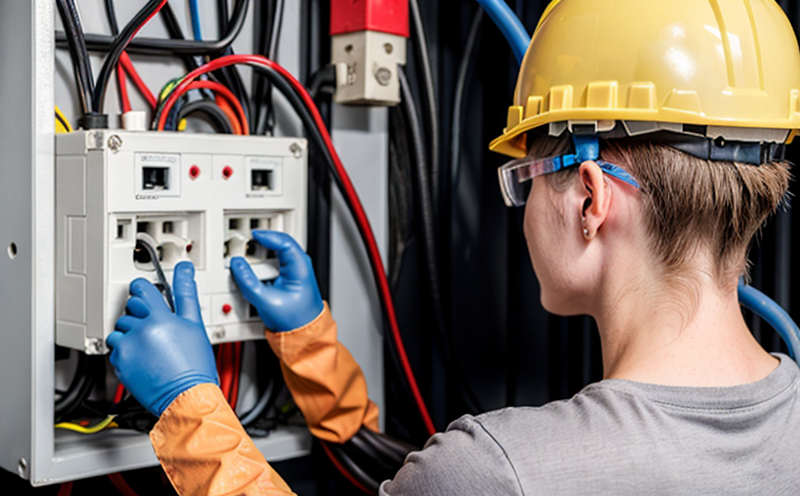UL 2580 Lithium-Ion Battery Safety for Smart Appliances
The UL 2580 standard is a critical document in the realm of smart home and IoT device safety, specifically focusing on lithium-ion batteries used in these devices. This standard ensures that batteries are safe to handle and use under typical operating conditions, thereby mitigating risks associated with fires, explosions, or other hazards. Compliance with UL 2580 is mandatory for manufacturers aiming to meet the stringent safety requirements set by leading retailers like Amazon, Walmart, and Home Depot.
The standard covers a broad range of tests designed to evaluate various aspects of battery safety. These include thermal cycling, high-temperature testing, low-temperature testing, vibration testing, mechanical abuse testing, charge/discharge cycling, impact testing, over-current testing, over-voltage/over-temperature protection, and more. The primary goal is to ensure that the batteries do not fail in ways that could lead to dangerous situations.
Manufacturers must also provide a detailed report outlining all test parameters and results as part of UL 2580 compliance. This documentation serves multiple purposes: it ensures transparency for retailers, provides assurance to consumers, and helps in maintaining brand reputation. The standard is regularly updated to incorporate the latest safety findings and technological advancements.
Compliance with UL 2580 involves more than just passing tests; it requires a holistic approach that includes robust design practices, rigorous testing protocols, and continuous improvement processes. This ensures not only current compliance but also future-proofing against emerging risks in smart home technology.
| UL 2580 Compliance Tests | |
|---|---|
| Thermal Cycling | Vibration Testing |
| High-Temperature Testing | Mechanical Abuse Testing |
| Low-Temperature Testing | Over-Current Testing |
| Charge/Discharge Cycling | Impact Testing |
| Over-Voltage/Over-Temperature Protection | Environmental Stress Screening |
The standard's emphasis on environmental stress screening is particularly important for smart home devices, which may be exposed to a wide range of operating conditions. This ensures that batteries can withstand real-world stresses without compromising safety.
In conclusion, ensuring compliance with UL 2580 is not just about meeting regulatory requirements but also about building trust and reliability in the market. It plays a crucial role in safeguarding users from potential hazards while fostering innovation within the smart home sector.
Applied Standards
- UL 2580: Standard for Safety of Lithium-Ion Batteries for Smart Appliances
- IEC 61960-2: Safety Requirements for Lithium Ion Cells and Batteries Intended for Use in Information Technology Equipment
- EN 62619: Requirements for the safety of lithium-ion cells and batteries intended for use in consumer products, including but not limited to smart home devices
The UL 2580 standard is closely aligned with other international standards such as IEC 61960-2 and EN 62619. Together, these standards provide a comprehensive framework for ensuring the safety of lithium-ion batteries in smart home applications.
Competitive Advantage and Market Impact
- Enhances brand reputation by demonstrating commitment to safety
- Promotes trust among consumers who prioritize product safety
- Facilitates easier access to major retail channels like Amazon, Walmart, and Home Depot
- Supports compliance with international regulations and standards
- Attracts investment from safety-conscious investors
- Fosters long-term relationships with regulators and certification bodies
Compliance with UL 2580 offers significant competitive advantages for manufacturers. By ensuring that their products meet the highest safety standards, companies can differentiate themselves in a crowded market. This compliance also opens doors to key retail platforms, enhancing distribution channels and market reach.
Use Cases and Application Examples
The UL 2580 standard is particularly relevant for manufacturers of smart home devices that incorporate lithium-ion batteries, such as thermostats, security systems, smart speakers, and energy management systems. These devices often operate in close proximity to users or are frequently moved around the house, making battery safety a critical concern.
For instance, a manufacturer of a smart thermostat would need to ensure that its lithium-ion batteries meet UL 2580 requirements before marketing the product. This includes passing all required tests and providing detailed documentation on test results. Similarly, companies developing security systems or energy management devices must comply with these standards to ensure their products are safe for use in homes.
By adhering to UL 2580, manufacturers not only meet regulatory requirements but also demonstrate a commitment to consumer safety. This can be particularly important when dealing with devices that may be left unattended or used by children and elderly individuals who might not have the same level of awareness about battery safety.





